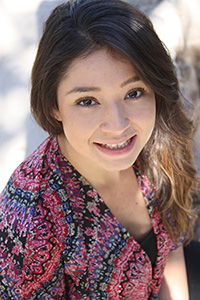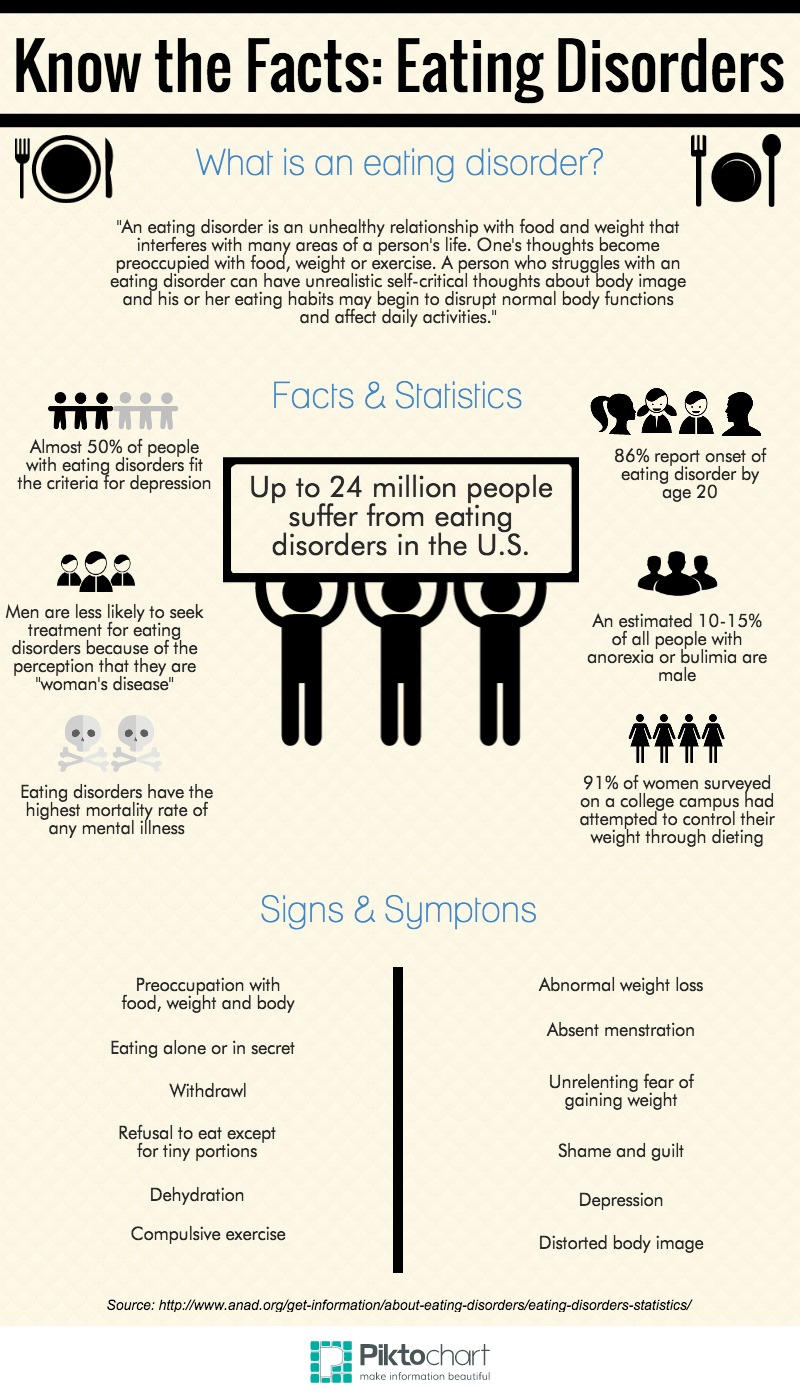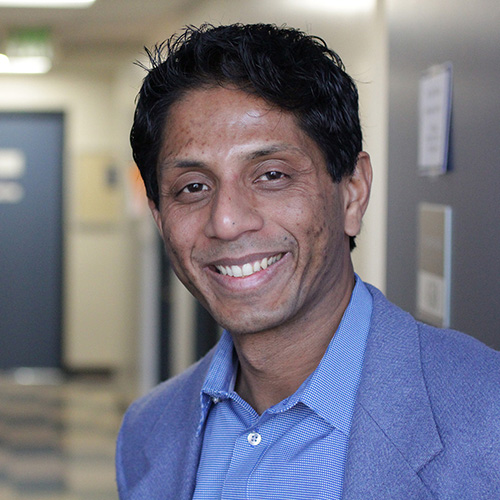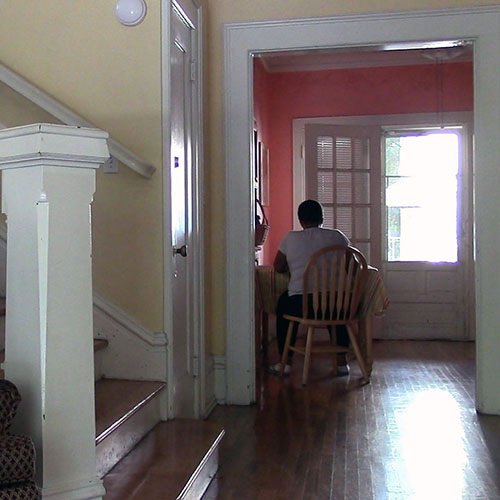Problem For One, Problem For All
Marissa Navares survived her eating disorder, but some of the issues she faced are common for others who are suffering from an eating disorder.
By the time Marissa Navares was 21 she had been living with a serious eating disorder for six years. During the summer of 2012 Navares' roommate, Ashley Rollans, sat Navares down in their Fresno home and told her she had a problem and she needed to seek treatment.
"She gave to me what I probably needed: for someone to be real with me and for someone to put it in perspective and not be nice about it either," Navares said.
Rollans explained to Navares that she was getting nowhere by continuing the same cycle. She pointed out how she was lying to her loved ones by hiding a disorder and how her constant mood changes affected her relationships.
"I didn’t reject her at all. I didn’t deny anything. I didn’t put blame on anyone. I was just so willing," said Marissa Navares.
Navares said she knew her bulimia nervosa was a problem since her high school days in Coalinga, but that conversation pushed her to get help and choose a life of recovery.
Navares was ready to get treatment, but finances stood in the way. She wanted to go to an inpatient facility called Rebecca’s House in Irvine, Calif., but her treatment was going to cost $15,000-$20,000 per month before insurance and after insurance she still had to come up with close to $3,000.
With little money and no savings, Navares thought her chances of receiving treatment were impossible. She told the woman from Rebecca's House there was no way she or her family could afford the cost and the woman said, "I'm sorry we couldn't make this work."
But the next day, the woman from Rebecca's House called back. She had an offer for Navares.
Experimenting With Purging
Marissa Navares was born on February 24, 1991 in Whittier, California. Her mother, Sabrina Navares, was a single parent.
"I had her when I was 20. So basically my family—my sisters my brothers—helped with raising her because I lived at home," Sabrina Navares said.

Navares in 2010. (Photo courtesy of Marissa Navares)
"It was always date night with us. It was almost like we were a couple. Like always doing everything together," Marissa said. She said her mother would keep her busy with trips to the local YMCA, trips to the beach or going on walks together.
Life for Marissa was simple until high school. That’s when her mom met a man and fell in love.
"I didn't care that she was dating—I don't think—until she started spending time away—like going on dates—away from me. I was just like that's weird. My mom doesn't do that. But I kind of just brushed it off," Marissa said.
RELATED: THE FACTS ABOUT EATING DISORDERS.
The man her mom fell in love with happened to be a teacher at California High School, Marissa's high school.
"I would get teased about it and I don't know why because I didn't care, but it bothered other people, like my group of friends," Marissa said. "Now I know it was because they didn't really like him, so they would give me a hard time about it."
Marissa said her mother started staying over with her new boyfriend some nights. "I just didn't like him yet. I couldn't pin down why. I just knew I didn't like him, he just rubbed me the wrong way."

After Marissa Navares' mom started dating, Marissa said she wanted a boyfriend too because she wanted someone to give her attention. (Photo by: Jessica Harrington)
She decided to get a boyfriend too. She said she wanted someone to give her attention and her boyfriend did.
The teasing from her friends and the, now limited, amount of time she had with her mother took a toll on Marissa. "I was just kind of struggling left and right. I just perceived it as I was losing my mom and I was losing my friends and I didn’t know what to do with myself," Marissa said. "My boyfriend at the time was someone who would give me attention. Whether it was good or bad, I took it."
"It was very hard for her because it had always just been me and her the whole time," Sabrina Navares said.
Marissa started purging her sophomore year. She got the idea after her best friend mentioned she had started throwing up to be skinny.
"It was completely experimental at first. I was like I'm going to give it a try and see what happens," Marissa said.
Dropping 35 Pounds
At the end of Marissa's sophomore year of high school, her mother got pregnant. Within a couple months, Sabrina Navares and her boyfriend were married and the family was moved to Coalinga, about four hours north of Whittier.

Marissa Navares completed two years of high school at California High School and had to do her second two years at Coalinga High School. (Photo by: Jessica Harrington)
"I remember being angry and bitter and numb at the same time." Marissa said. "She went from me never meeting anyone to boom, boom, boom like 'This is your new life'."
Her mother said the move was hard for her daughter. "She did two years of high school, so she had to do her final two years in a strange place, so that was really difficult for her and it was hard for me too because I was starting a blended family," Sabrina Navares said.
Despite being upset about the move, Marissa made friends quickly and she said she even forgot about purging for a while. However, after about nine months, her insecurities started coming back and she struggled to get along with her new stepfather.
"I just felt so disconnected, like literally like everything was out of my control," Marissa said. The longer the purging went on, the more frequently she would do it. "I lost 20 to 25 pounds within a month because I was doing it that often. Probably a couple times a day," she said.
"To me, I felt like the transition went well up until we started noticing changes in her weight. That's when we noticed, OK, there's definitely something wrong," Sabrina Navares said.
It was when people saw Marissa's senior portraits that people, including her mother and stepfather, really started to notice something was wrong with her. "She was just so thin and everybody was commenting on how thin she was.

Navares at her lowest weight, close to 90 pounds, during her senior pictures in 2009. (Photo courtesy of Marissa Navares)
That's where just her whole attitude had changed as far as just not taking care of herself, being kind of self destructive and careless around the house," Sabrina Navares said.
When Marissa first moved to Coalinga she was around 125 pounds. At the time of her pictures, she was 90 pounds.
Marissa said there were times where she felt like she was crying for help, but her parents didn't say anything. She said it wasn't until she approached them, mentioned she had a problem and told them she thought she needed help that they acknowledged the eating disorder.
"They were like 'Well no kidding, you've lost so much weight. We’re not stupid.' So I was like if you've known this all this time why didn't you say anything? They said 'Because we can't make you do what you're not going to do.'" Marissa Navares said. "I felt neglected at that point because they didn’t even try."
"I Felt Like A Failure"
Once it was out that Marissa had a problem, her mom said she knew they needed to find a way for her to get help, but resources were scarce.

Marissa Navares said at one point she was purging up to four times a day. (Photo by: Jessica Harrington)
Marissa said her mother did the best she could, by cooking healthy meals and asking her to stay out of the bedrooms and bathrooms after dinner to try to keep her from purging.
After admitting to her eating disorder Marissa abstained from purging for close to two months, but said she still thought about the act. The battle of the eating disorder was constant for her. She said she was always in and out, in and out.
Toward the end of her senior year she was purging twice a day, but stopped by the time she graduated in June 2009.
RELATED: HOW TO TALK TO SOMEONE YOU SUSPECT HAS AN EATING DISORDER.
In the fall semester of 2009 Marissa started college at California State University, Channel Islands and lived in the dorms on campus. She started binging and purging again that October.
"It was just all new for me new change, new lifestyle, new school, new home, new friends and I didn't know what to do with it. I think I started doing it every day like four times a day," Marissa said.
She said the process took away from her studies because her compulsive thoughts about food had returned. She would go to the cafeteria and pick out 1,000 calories worth of food, eat it and then purge it.

Marissa Navares tried outpatient care for 30 days, but she said she didn't like the program. She continued to hide her eating disorder for another year before seeking help. (Photo by: Jessica Harrington)
"It made absolutely no sense at all, but for me it was to take my mind off the stress, but doing it all just put more stress on me," Marissa said.
She recalls not having her period that November and thinking she was pregnant, even though she hadn't had sex in two months. She went to the doctor and the doctor attributed the missed period to stress from school. She later learned it was from the eating disorder.
When she returned home for Christmas break, she joined her family who had moved to Fresno. That is when Sabrina Navares suggested Marissa stop school and get treatment.
Marissa agreed to go and was put into intensive outpatient care at The Eating Disorder Center of Fresno at a facility that required her to go to the house for half a day, everyday.
She called the facility workers extremists who would write down every word that patients spoke, ask for feelings after every meal or snack, and place the blame for the eating disorder on whatever major event took place in a patient's life. The treatment didn't end up working for her.
After she left the program Marissa moved back in with her mom, stepfather, stepbrother, her half sister and her new baby half brother. Navares started school again at Fresno City College and fell right back into her disorder.

A pivotal conversation with her roommate changed Marissa Navares' life. (Photo by: Jessica Harrington)
Sabrina Navares said during the time Marissa was living at home she accumulated multiple traffic tickets, her sleeping patterns were all over the place and she would stay awake for long periods of time.
Marissa said she realized within a couple months her parents couldn't take living with her anymore because she was being messy, careless, self destructive, getting speeding tickets, and had no consideration for anyone else. “That's because I was depressed and didn’t want to do anything about it then and I didn't know how to. I felt like a failure.”
RELATED: HOW TWO ORGANIZATIONS ARE FUNDING SCHOLARSHIPS FOR EATING DISORDER TREATMENT.
Sabrina Navares said she worried Marissa would get her license taken away or get arrested because she was so consumed in her illness. Her husband pressured her to do something and Sabrina Navares said she knew she had to do something. They first sold her car and then decided they needed her to move out of the house.
“It became overwhelming so I said, 'OK, if I don’t force her to get help and fix herself then everybody is going to fall apart.'" Sabrina Navares said. “That's when we decided we'll ask her to leave.”
Marissa lived with roommates and worked two jobs for a year as she continued to hide her eating disorder. It was a year later when Ashley Rollans had the pivotal conversation with Marissa.
Sabrina Navares said she was very pleased when Marissa called and said she needed help. Marissa's stepfather and her extended family were also eager to help.
A New Start
When the woman from Rebecca's House called she told Marissa she wouldn't have to worry about money. She said if Marissa could check into treatment and Rebecca's House would fund her first 30 days.
Marissa remembers being initially upset over the phone call. "You’d think I’d be so relieved," she said. "But I was just still so in my disorder. I was like no because I wanted another excuse not to go."
However, the next day, Marissa said she came to her senses and decided to take their offer. She enjoyed the first month so much she asked for her family's to help fund a second month of treatment.

Marissa Navares will be attending California State University, Los Angeles during the spring semester of 2015. (Photo by: Jessica Harrington)

Today Marissa Navares works at Starbucks and a local restaurant in Whittier. (Photo by: Jessica Harrington)
Marissa Navares has always wanted to work in health, but has recently decided she wants to be an occupational therapist. (Photo by: Jessica Harrington)
After the two months of treatment Marissa was ready to start her new life. She left Rebecca's House and moved back in with her parents in Fresno. The road was not perfect, but today she has been relapse free for one year and 10 months.
"I see a very loving and passionate young lady. I'm just proud that we still have our relationship and it's been hurt, but it hasn’t been destroyed." Sabrina Navares said. "I'm happy that she didn't give up on me and I didn't give up on her."
Marissa Navares will start classes in March at California State University, Los Angeles, and will be working toward a degree as an occupational therapist. She said she feels motivated to move on with her life and do what she has always wanted. "I feel like I've never had more clarity, focus and confidence with what I want to do."
Funds, Facts & Friends

Saving Lives With Scholarships
Two organizations are working to provide scholarships for individuals who are ready to get treatment, but don't have the money to fund it.

Know the Facts
Knowing the facts and learning the signs and symptoms can help for early detection and prevention for people suffering with an eating disorder.

Talking Techniques
Starting a conversation can be hard, knowing the correct way to speak to someone who is dealing with an eating disorder can be the first step to treatment.
BACK TO TOP


